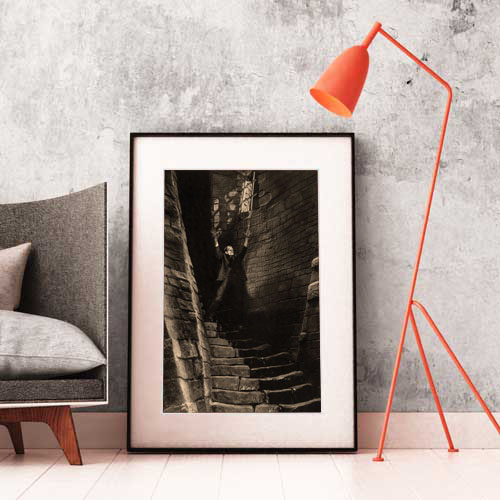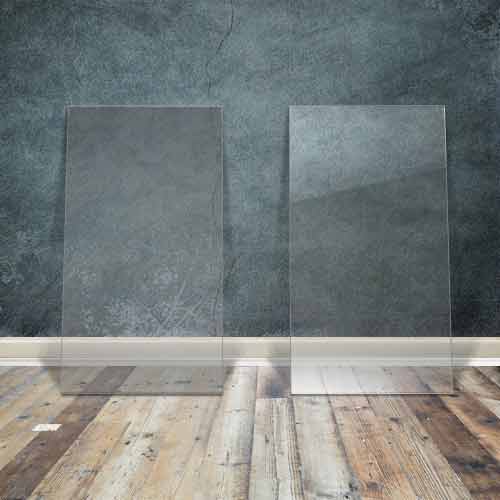Stunning theatrical publicity shot featuring Barbara Steele (Helen Rochefort / Mary) wearing a seductive black silk dress resting on her bed.
Black Sunday (Italian: La maschera del demonio, lit. 'The mask of the demon') is a 1960 Italian Gothic horror film directed by Mario Bava in his official directorial debut, and starring Barbara Steele and John Richardson. Loosely based on Nikolai Gogol's short story "Viy", the film takes place in Moldavia and tells the story of a witch who is put to death by her brother, only to return two centuries later to seek revenge upon his descendants.
Having provided cinematography on Hercules (1958) and Hercules Unchained (1959) for the production company Galatea and helping finish two of their other films, Caltiki – The Immortal Monster (1959) and The Giant of Marathon (1959), Bava was permitted by the company's president, Lionello Santi, to make a film for foreign markets; he chose to make a horror film to capitalize on the recent success of Terence Fisher's version of Dracula (1958) for Hammer Film Productions.
After he developed a four-page outline faithfully based on Gogol's story, several other screenwriters, both credited and un-credited, worked on the script. Former Rank Organisation contract players Steele and Richardson were cast as Bava felt that British leads would allow the film to compare favorably to Dracula. Filming took place in the studios of Scalera Film in Rome and on location at Castle Massimo in Arsoli; shooting was complicated by Bava's frequent reworking of the script and Steele's conflicts with the crew.
Black Sunday had limited financial success upon its initial Italian release. It was acquired for distribution in the United States by Samuel Z. Arkoff and James H. Nicholson of American International Pictures (AIP), who oversaw numerous alterations to the film prior to its American release, including the removal of some scenes of violence and sexuality, re-dubbing the dialogue, and replacing Roberto Nicolosi's musical score with one by Les Baxter. The film found greater success upon its American release in 1961 when it became the highest-grossing film to be released by AIP in its first five years of existence. The film was banned for several years in the United Kingdom and did not receive a wide release there until July 1968, when it was released by Border Films as Revenge of the Vampire.
The film received generally negative reviews in Italy but garnered far more positive reviews abroad in France and the United States, where it received favorable notices in Cahiers du Cinéma, New York Daily News, Time, and Variety. Retrospective reception of Black Sunday remains positive: it was placed at number 84 on a Time Out poll of the best horror films, while critic James Marriott praised the film as the "crowning achievement of Italian Gothic horror".
The film is now considered to be a pioneering work that set the standards for Italian horror films due to its juxtaposition of beautiful and horrific elements, with strong depictions of eroticism and graphic violence. These elements would be found in later Italian genres, such as the Spaghetti Western and the Giallo. The film turned Steele into a movie star in Italy, and led to her appearing in several horror film productions throughout the 1960s and 1970s.
Product Enquiry
Kodak Professional Endura Paper
Kodak Endura papers provide an incredible amount of detail and smooth transition of tones. Designed for the professional photographer in mind, looking for a more traditional photo print style, Kodak Endura provides an extended print life and color gamut almost at the level of a high end fine art paper print.
Archival Matte Paper
Archival Matte Paper, also known as Moab Lasal Photo Matte, is our house stock fine art paper and is an economical favorite for fine art reproductions and photo prints. It features a smooth surface, heavy weight (230 g, 9.5-mil), neutral white, matte paper engineered for accurate color reproduction that provides high contrast and high-resolution output. This paper is acid-free, making it the perfect choice for both photography & fine art reproductions.
Giclee William Turner Paper by Hahnemühle
The William Turner by Hahnemühle is one of the most popular papers used in the Giclee printing industry. This is a 310g natural white mould made natural line paper with 100% rag content making it highly archival. It has a slight coarse texture which gives photos and artwork an elegant look. These fine art paper prints (also known as Giclee) are ordered by galleries, individual artists and photographers. The papers and inks are not only archival but use some of the most accurate print technology for full color prints.
- Giclee prints use very expensive archival pigmented inks.
- Highest level of color gamut available in printing (12 color printing).
- Exceptional black & white printing.
- Fade resistant, pigmented inks which provide a superior color range compared to other types of inks. Widely preferred in fine art and photography circles.
- We ONLY use professional grade fine art and photo paper that resist yellowing and aging.
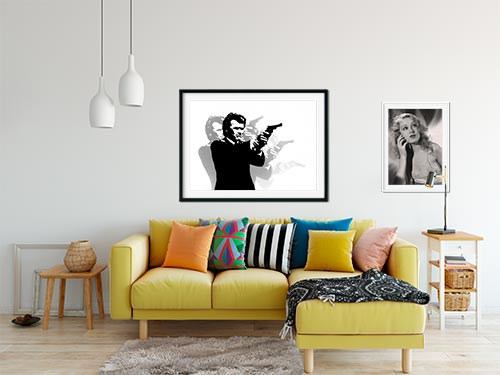
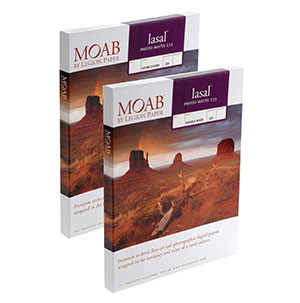
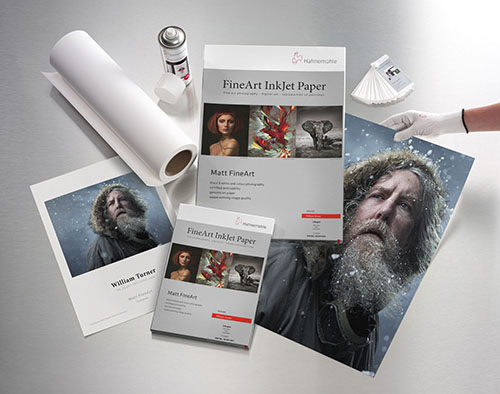
Framing
We offer wood and metal frames, custom cut & joined to order. Each framed print includes hanging hardware and foamcore backer.
Matting
We use conservation grade 100% virgin alpha-cellulose 2 ply mats with white core. Acid-free and lignin-free, these are both face resistant and meet all conservation quality standards set by the Fine Art Trade Guild. Mats are digitally cut for ultimate precision. The window will be 1/8″ smaller than the print dimensions.
Glazing (Acrylic Glass)
We offer custom cut panes of shatter-proof, acrylic glass, to protect your valuable artwork and prints.
Premium Clear
Framing grade clear acrylic is shatter resistant and lightweight.
Reflection Control
With its matte finish, Tru Vue Reflection Control® Acrylic scatters light to diminish unwanted glare.
Conservation Clear
Tru Vue Conservation Clear® Acrylic is a framing industry staple, blocking up to 99% of UV rays for ultimate protection.
Conservation Reflection Control
Tru Vue Conservation Reflection Control® Acrylic scatters and diffuses light to reduce unwanted glare. Blocks up to 99% of UV rays.
